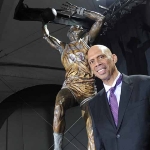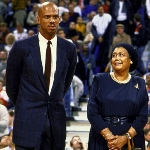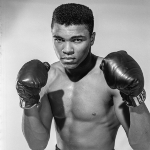Background
Kareem Abdul-Jabbar was born Ferdinand Lewis Alcindor, Jr., on April 16, 1947, in New York City, the only child of Ferdinand and Cora Alcindor. He grew up in middle-class circumstances in Inwood, an upper Manhattan neighborhood.















Kareem Abdul-Jabbar was born Ferdinand Lewis Alcindor, Jr., on April 16, 1947, in New York City, the only child of Ferdinand and Cora Alcindor. He grew up in middle-class circumstances in Inwood, an upper Manhattan neighborhood.
A Roman Catholic, he attended the St. Jude's parish elementary school, where he excelled in baseball, swimming, and ice skating. His height began to increase dramatically, and his characteristic self-consciousness led him to seek refuge on the basketball court. By the time he completed eighth grade, Jabbar's height had rocketed to six feet, six inches and he played basketball exclusively.
Already a local basketball legend, Jabbar was heavily recruited by many of the local New York preparatory schools. He chose Power Memorial Academy, and his six foot, eight inch height gave Coach Jack Donohue no alternative but to place him on the varsity squad, a rarity for a ninth grader. He spent the year building his coordination. As a sophomore averaging 19 points per game, Jabbar led his team to 27 straight victories en route to the 1963 New York City Catholic High School championship. Power Memorial's unbeaten streak continued the following year, as Jabbar averaged 26 points a game and led Power to another City Catholic High School championship. As a senior he averaged 33 points per game, and although Power's unbeaten streak of 71 games was snapped by DeMatha High School of Hyattsville, Maryland, they again won the New York City Catholic High School championship by going undefeated the rest of the season.
With the college offers as abundant as the publicity, Jabbar heeded the advice of notable African Americans such as Arthur Ashe, Jackie Robinson, and then Undersecretary of the United Nations Ralph Bunche and elected to accept the scholarship from the University of California at Los Angeles (UCLA). A conscientious student, he enrolled at UCLA in the fall of 1965 believing that there would be a strong balance between sports and academics there.
In 2011, Abdul-Jabbar received an honorary degree from New York Institute of Technology.
Although freshmen were ineligible to play varsity sports at the time, Jabbar gave Coach John Wooden a preview of his forthcoming dominance by leading the freshman team to an easy 75-60 victory over the varsity team that had already won the National Collegiate Athletic Association (NCAA) basketball championship in two of the preceding three seasons. In his first varsity game, Jabbar scored 56 points against California. Along with guards Mike Warren and Lucious Allen and forwards Kenny Heitz and Lynn Shackelford, Jabbar led UCLA to a perfect 26-0 season. The UCLA Bruins again won the national championship in 1967, beating Dayton in the final game.
Jabbar spurned a one-million dollar offer to sign with the Harlem Globetrotters after the 1967 season. In spite of the fact that he was a sensitive individual and somewhat of a loner, Jabbar was also extremely mature for his age and able to cope with constant media attention.
Although the 1967-1968 basketball season brought with it many more triumphs for Jabbar and the UCLA Bruins, Houston University handed UCLA their first loss after 47 consecutive victories. The 55, 000 fans at the Houston Astrodome who witnessed the 69-68 defeat saw Jabbar's six-foot, nine-inch nemesis, Elvin Hayes, score 39 points in college basketball's most exciting spectacle to that point. The UCLA team gained sweet revenge against the Cougars in the NCAA championship semi-final that year, scoring a lopsided 101-69 victory. They defeated North Carolina in the final game, to win the NCAA championship again in 1968.
UCLA also won the NCAA championship in 1969, losing only once along the way to Southern California. Jabbar's totals in three years of varsity play were a phenomenal 88 wins in 90 games, three straight NCAA championships, three straight years as the tournament's most valuable player, and a career average of 26 points per game on a. 639 shooting percentage. Many called him the greatest collegiate player ever.
Jabbar graduated from UCLA in 1969 and was the National Basketball Association's (NBA's) first draft choice, selected by the Milwaukee Bucks. He joined the Bucks reluctantly, but settled in to become the 1970 NBA Rookie of the Year. In 1971, Jabbar led the Bucks to the NBA championship and was named the NBA's league's most valuable player.
In the four seasons that followed, Jabbar perfected his trademark sky-hook and was named the NBA's most valuable player in the 1972 and 1974 seasons. In 1975, he was traded to the Los Angeles Lakers and earned even more accolades. He led the Lakers to NBA championships in 1980 and 1982 and was the NBA's most valuable player in 1976 and 1980.
Jabbar became one of the NBA's most prolific players and served as a positive representative for the league. He was named to the All-Star team every year, including his rookie season. An eloquent individual, Jabbar came out of an introverted phase to make numerous television show appearances and commercials. He also appeared in cameo roles in movies such as Bruce Lee's Enter the Dragon (1971), The Fish That Saved Pittsburgh (1979), and Airplane (1980).
During the 1984 season, Jabbar became the NBA's alltime scoring leader, eclipsing the record of 31, 419 points set by Wilt Chamberlain, and capped things off by leading the Lakers to yet another NBA championship in the 1984-1985 season. The following season, he broke the record of 1, 303 games played in the NBA.
Jabbar officially retired from the sport of basketball after the 1989-1990 season. He continued to remain very active following his retirement. In 1990, he penned yet another autobiography titled Kareem (an earlier one titled Giant Steps appeared in 1983). Black Profiles in Courage: A Legacy of African American Achievement was co-authored by Jabbar and Alan Steinberg, and released in 1996. In 1991, Jabbar traveled to Saudi Arabia to play basketball for an exhibition team entertaining troops involved in Operation Desert Storm. Jabbar also appeared in the Stephen King television mini-series The Stand in 1994. He has continued working as a producer and developer for motion pictures and television.

Kareem Abdul-Jabbar is hailed as one of the greatest Basketball players from America.
Jabbar was named one of President Bill Clinton's The Great Ones for National Sports Awards and was inducted into the Basketball Hall of Fame in 1995.
In 2011, Abdul-Jabbar was awarded the Double Helix Medal for his work in raising awareness for cancer research.
In late 2016, Abdul-Jabbar was awarded the Presidential Medal of Freedom by outgoing U. S. President Barack Obama.
In November 16, 2012 a statue of Abdul-Jabbar was unveiled in front of Staples Center on Chick Hearn Court, in Los Angeles.
At age 24 in 1971, he converted to Islam and became Kareem Abdul-Jabbar, which means “the noble one, servant of the Almighty.”
Quotations:
"One man can be a crucial ingredient on a team, but one man cannot make a team."
"You can't win unless you learn how to lose."
"I think that the good and the great are only separated by the willingness to sacrifice."
"Five guys on the court working together can achieve more than five talented individuals who come and go as individuals."
"I think race has been a burden for black Americans. Being Muslim has also been a challenge because so many people do not understand Islam."
"Great players are willing to give up their own personal achievement for the achievement of the group. It enhances everybody."
"A lot of players think the game is all about individual performances when it's really all about a team game."
Physical Characteristics: He was over six-feet tall, weighed 13 pounds. Abdul-Jabbar suffers from migraines.
Kareem Abdul-Jabbar was married to Habiba Abdul-Jabbar, born Janice Brown, and they have three children: Habiba, Sultana, and Kareem Jr. They divorced in 1978. He has another son, Adam, with his ex-girlfriend Cheryl Pistono.


